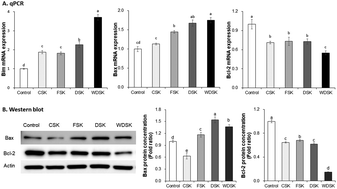Lower Mg and S contents in solar salt used in kimchi enhances the taste and anticancer effects on HT-29 colon carcinoma cells
Abstract
The anticancer effects of kimchi prepared with different kinds of solar salts were evaluated in an in vitro cellular system using HT-29 human colon carcinoma cells. Four kinds of kimchi samples were prepared, using different solar salts: conventionally manufactured solar salt (CS), filtered sea water solar salt (FS), dehydrated solar salt by centrifuging (DS), and washed-dehydrated solar salt (WDS). Prepared kimchi samples were presented as CSK, FSK, DSK, and WDSK, respectively. The pH values, acidity, and sensory evaluation were determined after 3 week fermentation at 5 °C (pH 4.3), and WDSK exhibited the best fermented characteristics and taste among the 4 samples examined. In the HT-29 cell growth inhibitory activity assay, all 4 kimchi samples exert dose-dependent cell growth inhibition, with WDSK showing significant growth inhibition of HT-29 cells. mRNA and protein expression levels of apoptosis and cell cycle arrest related factors reveals that WDSK significantly increases the mRNA expression levels of Bax, Bim, caspases-3, caspases-9, and p21 as compared to other kimchi samples, at a concentration of 4.0 mg mL−1. In addition, WDSK treatment strongly decreases the Bcl-2 protein expression (on western blot) in HT-29 cells, as compared to the control group (no kimchi treatment) and significantly increases the protein expression levels of Bax, caspases-3, caspases-9, and p53. Inductively coupled plasma atomic emission spectrometry (ICP-OES) reveals that WDS possesses a different mineral composition when compared to the other three solar salts; notably, the lower Mg (9.3 g kg−1) and S (4.7 g kg−1) content of WDS may cause better taste, fermented characteristcs, and functionality of WDSK. These results indicate WDS to be the ideal solar salt for kimchi preparation, which enhances the taste due to its lower Mg and S contents, and increases the anticancer effects by exerting better pro-apoptosis and cell cycle arrest abilities in HT-29 cells.



 Please wait while we load your content...
Please wait while we load your content...